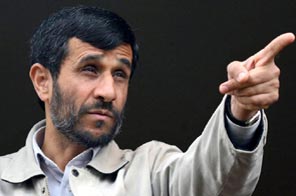Ahmadinejad sworn in for 2nd term
TEHRAN: Mahmoud Ahmadinejad was sworn in as Iranian president on Wednesday as riot police broke up an opposition protest over an election that triggered the worst turmoil in the Islamic republic's history.
The 52-year-old hardliner took the oath of office for another four-year term at a ceremony in parliament, defiantly vowing to resist "oppressive powers" and saying his June election marked a major change in Iran.
But prominent opposition leaders were absent from the ceremony, and outside riot police and Basij volunteer Islamic militiamen used pepper gas against demonstrators who claim his landslide victory was fraudulent, witnesses said.
"The protesters were chanting anti-Ahmadinejad slogans. The police and the Basijis dispersed them. All the nearby shops are closed," a witness said.
Wednesday's ceremony was attended by about 240 of Iran's 290 MPs as well as clerics, but prominent opposition leaders including Ahmadinejad's main defeated challenger Mir Hossein Mousavi were absent, as was powerful cleric and former president Akbar Hashemi Rafsanjani.
After taking the oath, Ahmadinejad has a two-week deadline to form a new government that is likely to remain on a collision course with the West, particularly over Iran's controversial nuclear drive.
"We will resist oppressors and try to correct the global discriminatory mechanisms in order to benefit all the nations of the world," Ahmadinejad said in his address to parliament.
"The June 12 epic is the start of major change in Iran and in the world."
His re-election on June 12 had set off massive street protests, deadly violence, a raft of political trials, increasing divisions among the ruling elite and further isolated Iran on the world stage.
About 30 people were killed in the violence, hundreds wounded and around 2,000 initially arrested, while around 110 have been put on trial.
Ahmadinejad's presidency was formally endorsed on Monday by supreme leader Ayatollah Ali Khamenei, who described him as "courageous, astute and hardworking."
Iran's judiciary chief Ayatollah Mahmoud Hashemi Shahrudi had on Tuesday urged rival political groups to unite, saying: "I hope they do what is best for the revolution, the regime, and Islam and disappoint the enemies."
White House spokesman Robert Gibbs on Tuesday acknowledged Ahmadinejad as the "elected" president of Iran, but stopped short of declaring him the "legitimate" president.
"He's the elected leader," Gibbs said, adding however that Washington had no plans to congratulate the firebrand leader on his inauguration.
Under President Barack Obama, the United States has made overtures for dialogue with Iran after three decades of severed ties, but Tehran has failed to respond and vowed to press on with its nuclear work.
Amnesty International's secretary general Irene Khan said Iran, a country of 71 million people, was caught in a spiralling cycle of repression.
Ahmadinejad's inauguration should be "the moment for the supreme leader and those around him to turn the page on the gross violations that have punctuated recent weeks and have been an all too familiar hallmark for many years," she said in a statement.
Khamenei on Monday warned his protege that the "angry, wounded opposition" would continue challenging his government.
He also told Ahmadinejad to heed the views of his critics, in a possible reference to the row between the president and his own conservative supporters over recent controversial political appointments.
Ahmadinejad in his second term is expected to keep up Iran's defiance of the international community over its nuclear programme which he aggressively pursued in his first stint despite UN sanctions.
Opponents accuse Ahmadinejad, who enjoyed windfall oil revenues in his first term, of mismanaging the economy, stoking inflation, wasting resources and manipulating statistics to cover his failures.
Iran's stance towards close US ally Israel is also likely to harden further during the second term of Ahmadinejad, who has repeatedly said the Jewish state is doomed to disappear.
Israel, the Middle East's sole if undeclared nuclear armed state, has stressed that it holds a military option to curb Tehran's atomic ambitions.






